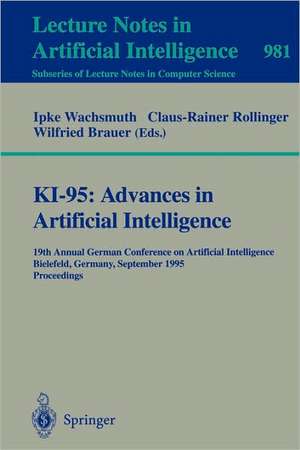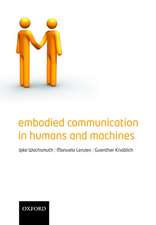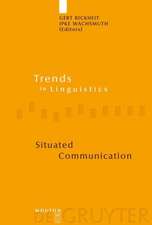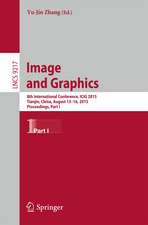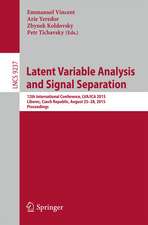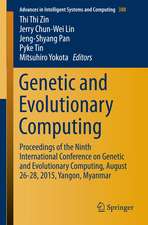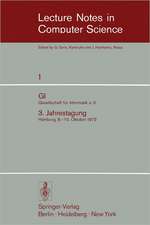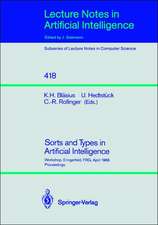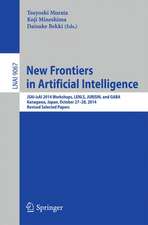KI-95: Advances in Artificial Intelligence: 19th Annual German Conference on Artificial Intelligence, Bielefeld, Germany, September 11 - 13, 1995. Proceedings: Lecture Notes in Computer Science, cartea 981
Editat de Ipke Wachsmuth, Claus-Rainer Rollinger, Wilfried Braueren Limba Engleză Paperback – 4 sep 1995
The volume opens with full versions of four invited papers devoted to the topic "From Intelligence Models to Intelligent Systems". The main part of the book consists of 17 refereed full papers carefully relected by the program committee; these papers are organized in sections on knowledge organization and optimization, logic and reasoning, nonmonotonicity, action and change, and spatial reasoning.
Din seria Lecture Notes in Computer Science
- 20%
 Preț: 1061.55 lei
Preț: 1061.55 lei - 20%
 Preț: 307.71 lei
Preț: 307.71 lei - 20%
 Preț: 438.69 lei
Preț: 438.69 lei - 20%
 Preț: 645.28 lei
Preț: 645.28 lei -
 Preț: 410.88 lei
Preț: 410.88 lei - 15%
 Preț: 580.46 lei
Preț: 580.46 lei - 17%
 Preț: 427.22 lei
Preț: 427.22 lei - 20%
 Preț: 596.46 lei
Preț: 596.46 lei -
 Preț: 381.21 lei
Preț: 381.21 lei - 20%
 Preț: 353.50 lei
Preț: 353.50 lei - 20%
 Preț: 1414.79 lei
Preț: 1414.79 lei - 20%
 Preț: 309.90 lei
Preț: 309.90 lei - 20%
 Preț: 583.40 lei
Preț: 583.40 lei - 20%
 Preț: 1075.26 lei
Preț: 1075.26 lei - 20%
 Preț: 310.26 lei
Preț: 310.26 lei - 20%
 Preț: 655.02 lei
Preț: 655.02 lei - 20%
 Preț: 580.93 lei
Preț: 580.93 lei - 20%
 Preț: 340.32 lei
Preț: 340.32 lei - 15%
 Preț: 438.59 lei
Preț: 438.59 lei - 20%
 Preț: 591.51 lei
Preț: 591.51 lei - 20%
 Preț: 649.49 lei
Preț: 649.49 lei - 20%
 Preț: 337.00 lei
Preț: 337.00 lei -
 Preț: 449.57 lei
Preț: 449.57 lei - 20%
 Preț: 607.39 lei
Preț: 607.39 lei - 20%
 Preț: 1024.44 lei
Preț: 1024.44 lei - 20%
 Preț: 579.30 lei
Preț: 579.30 lei - 20%
 Preț: 763.23 lei
Preț: 763.23 lei - 20%
 Preț: 453.32 lei
Preț: 453.32 lei - 20%
 Preț: 575.48 lei
Preț: 575.48 lei - 20%
 Preț: 585.88 lei
Preț: 585.88 lei - 20%
 Preț: 825.93 lei
Preț: 825.93 lei - 20%
 Preț: 763.23 lei
Preț: 763.23 lei - 17%
 Preț: 360.19 lei
Preț: 360.19 lei - 20%
 Preț: 1183.14 lei
Preț: 1183.14 lei - 20%
 Preț: 340.32 lei
Preț: 340.32 lei - 20%
 Preț: 504.57 lei
Preț: 504.57 lei - 20%
 Preț: 369.12 lei
Preț: 369.12 lei - 20%
 Preț: 583.40 lei
Preț: 583.40 lei - 20%
 Preț: 343.62 lei
Preț: 343.62 lei - 20%
 Preț: 350.21 lei
Preț: 350.21 lei - 20%
 Preț: 764.89 lei
Preț: 764.89 lei - 20%
 Preț: 583.40 lei
Preț: 583.40 lei -
 Preț: 389.48 lei
Preț: 389.48 lei - 20%
 Preț: 341.95 lei
Preț: 341.95 lei - 20%
 Preț: 238.01 lei
Preț: 238.01 lei - 20%
 Preț: 538.29 lei
Preț: 538.29 lei
Preț: 332.24 lei
Preț vechi: 415.30 lei
-20% Nou
Puncte Express: 498
Preț estimativ în valută:
63.58€ • 65.98$ • 53.14£
63.58€ • 65.98$ • 53.14£
Carte tipărită la comandă
Livrare economică 15-29 martie
Preluare comenzi: 021 569.72.76
Specificații
ISBN-13: 9783540603436
ISBN-10: 3540603433
Pagini: 288
Ilustrații: XIII, 275 p.
Dimensiuni: 155 x 235 x 15 mm
Greutate: 0.41 kg
Ediția:1995
Editura: Springer Berlin, Heidelberg
Colecția Springer
Seriile Lecture Notes in Computer Science, Lecture Notes in Artificial Intelligence
Locul publicării:Berlin, Heidelberg, Germany
ISBN-10: 3540603433
Pagini: 288
Ilustrații: XIII, 275 p.
Dimensiuni: 155 x 235 x 15 mm
Greutate: 0.41 kg
Ediția:1995
Editura: Springer Berlin, Heidelberg
Colecția Springer
Seriile Lecture Notes in Computer Science, Lecture Notes in Artificial Intelligence
Locul publicării:Berlin, Heidelberg, Germany
Public țintă
ResearchCuprins
Partially observable Markov decision processes for artificial intelligence.- Robust processing of natural language.- Distinction networks.- The problem of signal and symbol integration: A study of cooperative mobile autonomous agent behaviors.- An extension of explanation-based generalization to negation as failure.- Inducing integrity constraints from knowledge bases.- Dynamic structuring of lexical knowledge in a reusability scenario.- Efficient memory-limited graph search.- Quality-based terminological reasoning for concept learning.- Task acquisition with a description logic reasoner.- Parallelizing description logics.- Automated termination proofs with measure functions.- What is a skeptical proof?.- Default entailment.- Actions that make you change your mind.- Reasoning about action with typical and atypical effects.- Reasoning about action and change: Actions with abnormal effects.- Temporal logic based on characteristic functions.- Computational properties of qualitative spatial reasoning: First results.- An empirically validated model for computing spatial relations.- Integrating vision and language: Towards automatic description of human movements.
